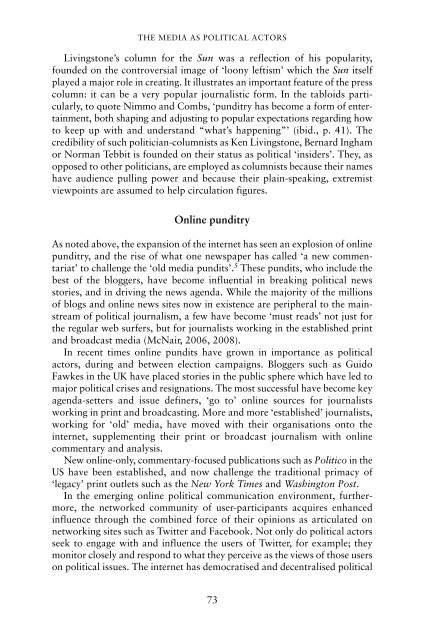20130412164339753295_book_an-introduction-to-political-communication
20130412164339753295_book_an-introduction-to-political-communication
20130412164339753295_book_an-introduction-to-political-communication
You also want an ePaper? Increase the reach of your titles
YUMPU automatically turns print PDFs into web optimized ePapers that Google loves.
THE MEDIA AS POLITICAL ACTORS<br />
Livings<strong>to</strong>ne’s column for the Sun was a reflection of his popularity,<br />
founded on the controversial image of ‘loony leftism’ which the Sun itself<br />
played a major role in creating. It illustrates <strong>an</strong> import<strong>an</strong>t feature of the press<br />
column: it c<strong>an</strong> be a very popular journalistic form. In the tabloids particularly,<br />
<strong>to</strong> quote Nimmo <strong>an</strong>d Combs, ‘punditry has become a form of entertainment,<br />
both shaping <strong>an</strong>d adjusting <strong>to</strong> popular expectations regarding how<br />
<strong>to</strong> keep up with <strong>an</strong>d underst<strong>an</strong>d “what’s happening”’ (ibid., p. 41). The<br />
credibility of such politici<strong>an</strong>-columnists as Ken Livings<strong>to</strong>ne, Bernard Ingham<br />
or Norm<strong>an</strong> Tebbit is founded on their status as <strong>political</strong> ‘insiders’. They, as<br />
opposed <strong>to</strong> other politici<strong>an</strong>s, are employed as columnists because their names<br />
have audience pulling power <strong>an</strong>d because their plain-speaking, extremist<br />
viewpoints are assumed <strong>to</strong> help circulation figures.<br />
Online punditry<br />
As noted above, the exp<strong>an</strong>sion of the internet has seen <strong>an</strong> explosion of online<br />
punditry, <strong>an</strong>d the rise of what one newspaper has called ‘a new commentariat’<br />
<strong>to</strong> challenge the ‘old media pundits’. 5 These pundits, who include the<br />
best of the bloggers, have become influential in breaking <strong>political</strong> news<br />
s<strong>to</strong>ries, <strong>an</strong>d in driving the news agenda. While the majority of the millions<br />
of blogs <strong>an</strong>d online news sites now in existence are peripheral <strong>to</strong> the mainstream<br />
of <strong>political</strong> journalism, a few have become ‘must reads’ not just for<br />
the regular web surfers, but for journalists working in the established print<br />
<strong>an</strong>d broadcast media (McNair, 2006, 2008).<br />
In recent times online pundits have grown in import<strong>an</strong>ce as <strong>political</strong><br />
ac<strong>to</strong>rs, during <strong>an</strong>d between election campaigns. Bloggers such as Guido<br />
Fawkes in the UK have placed s<strong>to</strong>ries in the public sphere which have led <strong>to</strong><br />
major <strong>political</strong> crises <strong>an</strong>d resignations. The most successful have become key<br />
agenda-setters <strong>an</strong>d issue definers, ‘go <strong>to</strong>’ online sources for journalists<br />
working in print <strong>an</strong>d broadcasting. More <strong>an</strong>d more ‘established’ journalists,<br />
working for ‘old’ media, have moved with their org<strong>an</strong>isations on<strong>to</strong> the<br />
internet, supplementing their print or broadcast journalism with online<br />
commentary <strong>an</strong>d <strong>an</strong>alysis.<br />
New online-only, commentary-focused publications such as Politico in the<br />
US have been established, <strong>an</strong>d now challenge the traditional primacy of<br />
‘legacy’ print outlets such as the New York Times <strong>an</strong>d Washing<strong>to</strong>n Post.<br />
In the emerging online <strong>political</strong> <strong>communication</strong> environment, furthermore,<br />
the networked community of user-particip<strong>an</strong>ts acquires enh<strong>an</strong>ced<br />
influence through the combined force of their opinions as articulated on<br />
networking sites such as Twitter <strong>an</strong>d Face<strong>book</strong>. Not only do <strong>political</strong> ac<strong>to</strong>rs<br />
seek <strong>to</strong> engage with <strong>an</strong>d influence the users of Twitter, for example; they<br />
moni<strong>to</strong>r closely <strong>an</strong>d respond <strong>to</strong> what they perceive as the views of those users<br />
on <strong>political</strong> issues. The internet has democratised <strong>an</strong>d decentralised <strong>political</strong><br />
73
















